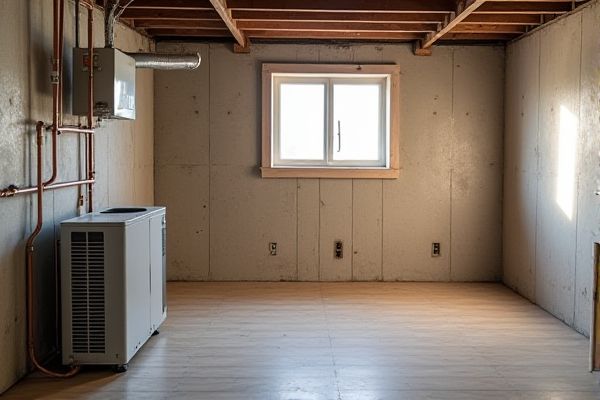
Heat pumps offer efficient temperature control and energy savings for basements compared to traditional baseboard heating, which typically relies on electric resistance and can lead to higher utility costs. Explore the rest of this article to discover which heating solution best suits your basement needs and budget.
Table of Comparison
| Feature | Heat Pump | Baseboard Heating |
|---|---|---|
| Energy Efficiency | High (3x more efficient than electric resistance) | Moderate (electric resistance, less efficient) |
| Installation Cost | Higher (complex system, upfront investment) | Lower (simple, direct electric heaters) |
| Operating Cost | Lower (due to energy efficiency) | Higher (electric resistance uses more energy) |
| Heating Speed | Moderate (depends on system size) | Fast (direct electric heating) |
| Maintenance | Requires periodic service (compressor, refrigerant) | Minimal (few moving parts) |
| Space Requirements | Indoor and outdoor units needed | Compact, mounted on walls |
| Noise Level | Moderate (outdoor unit noise) | Quiet (no moving parts) |
| Environmental Impact | Lower (uses less electricity, can use renewable sources) | Higher (pure electric resistance heating) |
| Lifespan | 15-20 years | 20-25 years |
| Best Use Case | Year-round efficient heating and cooling | Supplemental or zoned heating for smaller spaces |
Introduction to Basement Heating Options
Basement heating options include heat pumps and baseboard heating, each offering distinct benefits for temperature control and energy efficiency. Heat pumps provide versatile climate management by extracting heat from the air, ideal for consistent warmth and lower utility costs. Baseboard heaters deliver direct, zoned warmth through electric resistance, perfect for supplemental heating in smaller basement areas or poorly insulated spaces.
How Heat Pumps Work in Basements
Heat pumps in basements operate by extracting heat from the indoor air or ground, transferring it to heat the space efficiently through a refrigerant cycle. These systems utilize a compressor, evaporator, and condenser to move thermal energy, providing consistent warmth even in lower temperatures. Their ability to reverse the cycle allows for cooling in summer, making heat pumps a versatile option compared to traditional baseboard heating, which relies solely on electric resistance to generate heat.
Understanding Baseboard Heating Systems
Baseboard heating systems use electric or hydronic elements installed along the base of walls to provide consistent, radiant heat by warming the surrounding air. These systems are often simple to install and operate quietly, making them a reliable choice for basement heating. Understanding the efficiency differences between baseboard heating and heat pumps can help you select the best solution tailored to your basement's insulation and heating needs.
Energy Efficiency Comparison
Heat pumps offer significantly higher energy efficiency compared to baseboard heating, with COP (Coefficient of Performance) values often ranging from 3 to 4, indicating they produce 3 to 4 units of heat per unit of electricity consumed. Baseboard heaters, relying on electric resistance, have an efficiency close to 100%, but they convert electricity directly into heat without amplification, resulting in higher operational costs. This energy efficiency difference makes heat pumps a more sustainable and cost-effective option for basement heating.
Installation Requirements and Costs
Heat pump installation in basements requires adequate space for the external unit and professional setup of both indoor and outdoor components, with average costs ranging from $3,500 to $7,500. Baseboard heating systems are easier to install, usually fitting along walls with minimal disruption, and typically cost between $500 and $1,500 for electric models. Considering your basement's insulation and energy efficiency can influence long-term operational costs, making heat pumps more cost-effective despite higher upfront expenses.
Maintenance and Longevity
Heat pumps require regular maintenance, including filter cleaning and seasonal inspections, to ensure optimal efficiency and longevity, often lasting 15-20 years. Baseboard heating systems have minimal maintenance needs but rely on electrical resistance elements that typically last around 20-25 years with occasional thermostat or wiring checks. Proper upkeep of either system can extend lifespan and improve energy performance in basement heating applications.
Comfort and Temperature Control
Heat pumps offer superior comfort and precise temperature control in basements by distributing consistent warmth and adjusting settings efficiently to maintain your desired climate. Baseboard heating provides steady heat but lacks the responsiveness and even distribution of a heat pump, often resulting in uneven temperature zones. Choosing a heat pump enhances energy efficiency and gives you greater control over basement comfort throughout the year.
Environmental Impact Considerations
Heat pumps offer a more environmentally friendly option for basement heating by utilizing electricity to transfer heat rather than generating it through combustion, significantly reducing greenhouse gas emissions compared to baseboard heating systems powered by fossil fuels. Baseboard heaters, typically reliant on electric resistance, consume more energy and contribute to higher carbon footprints. Your choice impacts energy efficiency and sustainability, with heat pumps supporting cleaner energy use and lowering environmental impact.
Cost Analysis and Return on Investment
Heat pumps typically have higher upfront costs compared to baseboard heating but offer significantly lower operating expenses due to greater energy efficiency, especially in moderate climates. Baseboard heaters incur lower installation costs but result in higher electricity bills over time, impacting your long-term savings. Evaluating the return on investment favors heat pumps when factoring in energy savings, potential rebates, and increased home value over a 5 to 10-year period.
Choosing the Best Heating Solution for Your Basement
When selecting the best heating solution for your basement, consider heat pumps for their energy efficiency and ability to provide both heating and cooling throughout the year. Baseboard heating offers a cost-effective installation and silent operation but typically results in higher energy bills due to electric resistance heating. Your choice should balance upfront costs, energy consumption, and the desired comfort level in your basement space.
 homyna.com
homyna.com